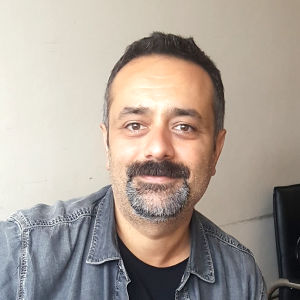Serhat Karaca

From
Department of Animal Science, Van Yuzuncu Yil University - TR
In residence at
Host scientist
Raymond Nowak
BIOGRAPHY
Serhat Karaca earned his PhD in Animal Science from Van Yüzüncü Yıl University in Türkiye, where he is currently a full-time Professor, lecturing and conducting research. His research aims to understand how physical and social environmental stress factors affect the behavior, performance, and meat quality of ruminants, particularly sheep and goats. In this context, he examines the behavioral and physiological stress responses of various breeding practices in ruminants to enhance these traits. He is currently leading research work on the role of temperament in sheep and their reactivity in rearing systems that may challenge their robustness. His research has focused on factors influencing the ability to cope with stress particularly in relation to motheroffspring behaviors, welfare and various performance parameters.
PROJECT
Alternative practice to artificial feeding in goat farming: consequences on behaviour, microbiota, health and milk quality
The artificial rearing method, involving the separation of mother and young immediately after birth, is commonly favored in intensive dairy goat farming for reasons such as mitigating health-related risks (controlling the transmission of Caprine arthritis and encephalitis virus – CAEV- and paratuberculosis). However, this practice has raised scientific and social criticism, particularly concerning its impact on the behavioral development and welfare of goats. Therefore, the extent to which the mother and offspring experience stress from separation, how this will affect the offspring's behavior and socialization in the future, and whether separation stress can be alleviated with appropriate management techniques become important questions. Today, there is a growing emphasis on approaches that harmonize economic sustainability with animal welfare and environmental considerations. Consequently, there has been a partial reversal of the trend towards intensive systems, with an increased interest in natural rearing practices. However, there is a notable gap in comprehensive studies addressing the holistic benefit/risk balance of rearing methods, encompassing aspects such as animal behavior and welfare, growth performance, microbiota development, and milk yield and quality. The existing body of knowledge on this subject is fragmented and insufficient to formulate precise recommendations. In response to this, the project seeks to bring originality by examining animal behavior and welfare from a multidisciplinary standpoint, considering the interconnected relationships between health, productivity, and product quality. The research question of the project has been defined as: "Can behavioral development and welfare in kids be improved through natural rearing without significant deterioration in parameters related to productivity, animal health, and milk quality?" The general hypothesis associated with the project is that the presence of the mother (psychological effect), her milk (nutritional effect), and her microbiota (bacterial effect) will support the performance, welfare, and health of naturally reared offspring. However, there is a risk that the mother’s pathogens (particularly Shiga toxin-producing Escherichia coli - STEC) may be transmitted to the offspring through horizontal transmission. The project is fully funded by INRAE over a period of 24 months and involves 5 INRAE partners.
Based on studies conducted on lambs and opinions from goat farmers, the project conduct to test two alternative methods: 1) having the kids cohabit with a few non-lactating adult goats, named “nannies” to provide social enrichment; 2) allowing mothers to nurse their young and to be machine-milked at the same time. Carrying out such work in dairy goats would make it possible to identify the benefits and disadvantages of three breeding systems: artificial suckling, the presence of nannies, and maternal nursing. The benefits will be measured in terms of social enrichment, behavioral facilitation by imitation of adults, construction of the microbiome, improvement of well-being and certain aspects of health. The risks associated with the transmission of pathogens from adults to young (CAEV, paratuberculosis, diarrheal E. coli, etc.) but also to milk, will be assessed and studied over the long term, from birth to the breeding of the goats and to their first lactation. The economic loss will be measured in the milk production of the nursing mothers. The challenge of this project is to reach an optimum in an equation taking into account animal welfare, essential health standard in milk composition, the constraints generated by the choice of a practice, and the satisfactory working conditions for farmers. Only a multidisciplinary approach will provide enough objective information. This is what makes our experimental approach original because, to our knowledge, no study combines such a level of interdisciplinarity in ruminants. Thus, the project aims to evaluate the benefit/risk balance of natural rearing compared to artificial rearing from a multidimensional perspective in terms of performance, milk quality, welfare, and health.
Research project funded by the metaprogramme « Santé et Bien-Etre Animal » INRAE (2024-2026).
